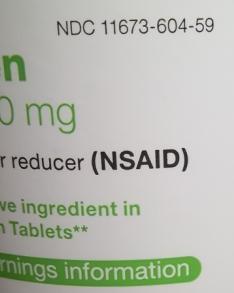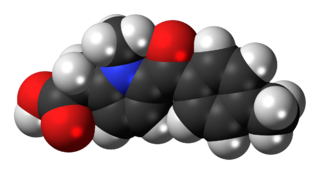
Aspirin is the genericized trademark for acetylsalicylic acid (ASA), a nonsteroidal anti-inflammatory drug (NSAID) used to reduce pain, fever, and inflammation, and as an antithrombotic. Specific inflammatory conditions that aspirin is used to treat include Kawasaki disease, pericarditis, and rheumatic fever.

Non-steroidal anti-inflammatory drugs (NSAID) are members of a therapeutic drug class which reduces pain, decreases inflammation, decreases fever, and prevents blood clots. Side effects depend on the specific drug, its dose and duration of use, but largely include an increased risk of gastrointestinal ulcers and bleeds, heart attack, and kidney disease.
An antipyretic is a substance that reduces fever. Antipyretics cause the hypothalamus to override a prostaglandin-induced increase in temperature. The body then works to lower the temperature, which results in a reduction in fever.

Ibuprofen is a nonsteroidal anti-inflammatory drug (NSAID) that is used to relieve pain, fever, and inflammation. This includes painful menstrual periods, migraines, and rheumatoid arthritis. It may also be used to close a patent ductus arteriosus in a premature baby. It can be taken orally or intravenously. It typically begins working within an hour.

Diclofenac, sold under the brand name Voltaren among others, is a nonsteroidal anti-inflammatory drug (NSAID) used to treat pain and inflammatory diseases such as gout. It can be taken orally, inserted rectally as a suppository, injected intramuscularly, injected intravenously, applied to the skin topically, or through eye drops. Improvements in pain last up to eight hours. It is also available as the fixed-dose combination diclofenac/misoprostol (Arthrotec) to help protect the stomach.

Naproxen, sold under the brand name Aleve among others, is a nonsteroidal anti-inflammatory drug (NSAID) used to treat pain, menstrual cramps, and inflammatory diseases such as rheumatoid arthritis, gout and fever. It is taken orally. It is available in immediate and delayed release formulations. Onset of effects is within an hour and lasts for up to twelve hours. Naproxen is also available in salt form, naproxen sodium, which has better solubility when taken orally.
Anti-inflammatory or antiphlogistic is the property of a substance or treatment that reduces inflammation or swelling. Anti-inflammatory drugs, also called anti-inflammatories, make up about half of analgesics. These drugs remedy pain by reducing inflammation as opposed to opioids, which affect the central nervous system to block pain signaling to the brain.

Excedrin is an over-the-counter headache pain reliever, typically in the form of tablets or caplets. It contains paracetamol, aspirin and caffeine. It was manufactured by Bristol-Myers Squibb until it was purchased by Novartis in July 2005 along with other products from BMS's over-the-counter business. As of March 2015, GSK holds majority ownership of Excedrin through a joint venture transaction with Novartis. On July 18, 2022, GSK spun off its consumer healthcare business to Haleon.

Carprofen is a nonsteroidal anti-inflammatory drug (NSAID) of the carbazole and propionic acid class that was previously for use in humans and animals but is now only available to veterinarians for prescribing as a supportive treatment for various conditions in animals. Carprofen reduces inflammation by inhibition of COX-1 and COX-2; its specificity for COX-2 varies from species to species. Marketed under many brand names worldwide, carprofen is used as a treatment for inflammation and pain, including joint pain and postoperative pain.

Deracoxib is a nonsteroidal anti-inflammatory drug (NSAID) of the coxib class, used in dogs to treat pain associated with osteoarthritis, or to prevent pain following orthopedic or dental surgery. It is available as beef-flavored tablets.

Tolmetin is a nonsteroidal anti-inflammatory drug (NSAID) of the heterocyclic acetic acid derivative class.

Dexketoprofen is a nonsteroidal anti-inflammatory drug (NSAID). It is manufactured by Menarini, under the tradename Keral. It is available in the UK, as dexketoprofen trometamol, as a prescription-only drug and in Latin America as Enantyum, produced by Menarini. Also, in Italy and Spain it is available as an over-the-counter drug (OTC) under the trade name Enandol or Enantyum. In Hungary it is available from a pharmacy as "Ketodex". In Turkey, it is an over the counter medicine under the name "Arveles". In Latvia, Lithuania and Estonia it is available as an OTC under the tradename Dolmen. In Mexico it is available in tablet form as "Stadium" made by Menarini. It is the dextrorotatory stereoisomer of ketoprofen.

Lornoxicam, also known as chlortenoxicam, is a nonsteroidal anti-inflammatory drug (NSAID) of the oxicam class with analgesic, anti-inflammatory and antipyretic properties. It is available in oral and parenteral formulations.

Tenoxicam, sold under the brand name Mobiflex among others, is a nonsteroidal anti-inflammatory drug (NSAID). It is used to relieve inflammation, swelling, stiffness, and pain associated with rheumatoid arthritis, osteoarthritis, ankylosing spondylitis, tendinitis, bursitis, and periarthritis of the shoulders or hips.

A transdermal analgesic or pain relief patch is a medicated adhesive patch used to relieve minor to severe pain. There are many types of analgesic patches based on the main ingredients in the patches. These include patches containing counterirritants, which are used to treat mild to moderate pain, and patches containing opioids such as buprenorphine and fentanyl, used to relieve moderate to severe pain. Fentanyl is often used for opioid-tolerant patients. Nitroglycerin, also known as glyceryl trinitrate (GTN), a medication used for heart failure, high blood pressure, anal fissures, painful periods, and to treat and prevent chest pain, can also be found in patches. Beyond these are patches that contain drugs such as diclofenac and lidocaine and various other drugs. The main purpose of transdermal analgesic patches are to administer drugs in a more viable way to patients, as opposed to oral consumption or intravenous administration such as an injection.
Ibuprofen/paracetamol, sold under the brand name Combogesic among others, is a fixed-dose combination of two medications, ibuprofen, a non-steroidal anti-inflammatory drug (NSAID); and paracetamol (acetaminophen), an analgesic and antipyretic. It is available as a generic medication.

Medherant Ltd is a British pharmaceutical company, based in Coventry. The company develops over-the-counter (OTC) and prescription transdermal patches for drug delivery.

An antiarthritic is any drug used to relieve or prevent arthritic symptoms, such as joint pain or joint stiffness. Depending on the antiarthritic drug class, it is used for managing pain, reducing inflammation or acting as an immunosuppressant. These drugs are typically given orally, topically or through administration by injection. The choice of antiarthritic medication is often determined by the nature of arthritis, the severity of symptoms as well as other factors, such as the tolerability of side effects.

Methenamine/sodium salicylate, sold under the brand name Cystex among others, is a combination drug comprising methenamine and sodium salicylate. Methenamine serves as a urinary antiseptic and antibacterial agent, while sodium salicylate is a nonsteroidal anti-inflammatory drug (NSAID) and analgesic. The combination is used for the treatment and prevention of urinary tract infection (UTI) symptoms.
















